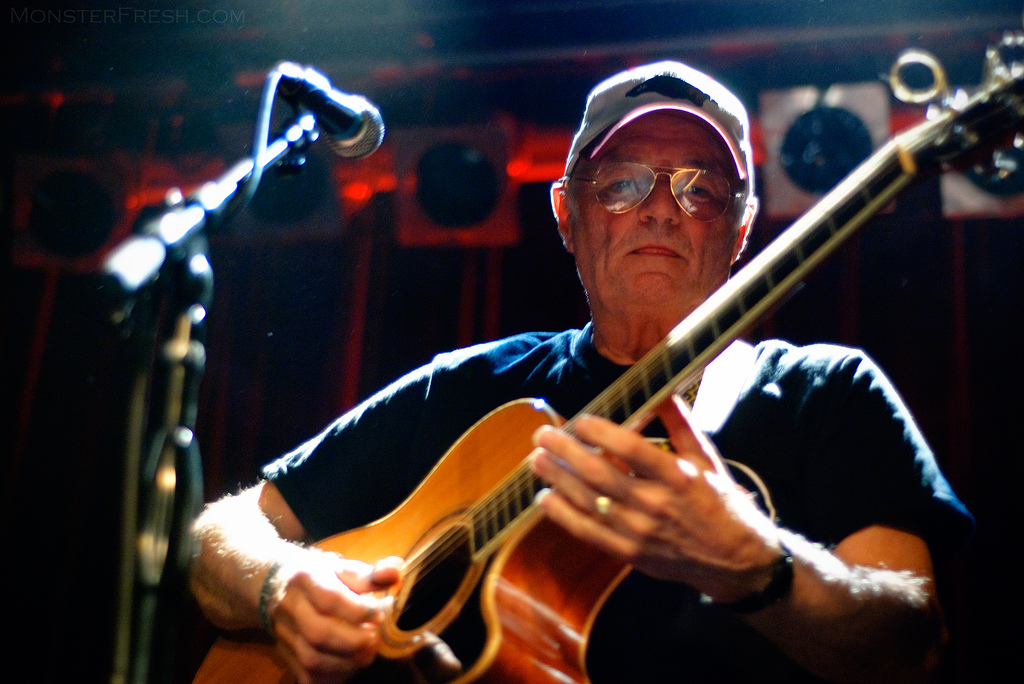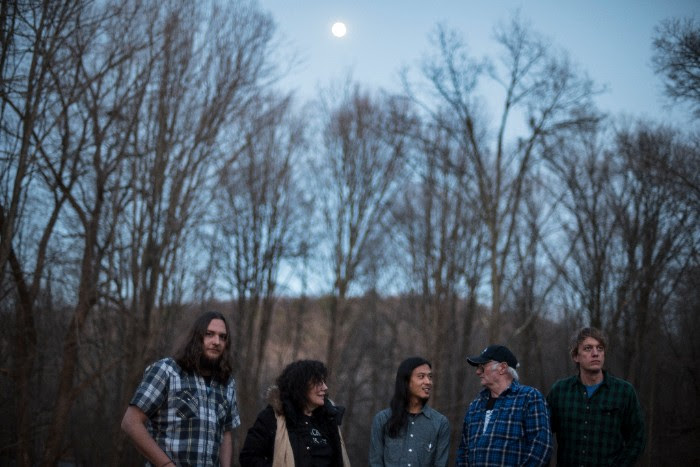Stream Michael Chapman’s New Steve Gunn-Produced LP, 50 In Full
5 decades into his career, the UK singer/songwriter/guitar virtuoso teams up w/a crew of musicians to release a rare full-band collaborative effort. Hear it now!

Seattle, Wa – June 22, 2011
Michael Chapman may be 5 decades deep into an highly influential musical career, but I didn’t first become aware of him until 2013, when he opened for Bill Callahan during his Apocalypse tour stop in Seattle. I arrived at the venue early and was posted up front by the stage when Chapman entered solo with his acoustic guitar in hand. He was sporting jeans, a navy blue t-shirt with some printing on it, and a khaki Arkansas Razorbacks cap with a curved bill. Combined with the rest of his accessories — a wristwatch, a wedding ring, and a pair of gold-rimmed aviator style eyeglasses — it rounded out an aesthetic that I’d encountered from an endless number of aging, hard-living suburban dads in America that had survived by working manual labor gigs their whole lives — an electric drill in one hand and a Budweiser in the other. Chapman‘s appearance these days is quite different from the long-haired bearded gent that graced the cover of albums like 1971‘s Wrecked Again, and when he opened his mouth, I was surprised to hear a Yorkshire accent exit his lips. The finger work of the UK guitar virtuoso is mesmerizing and, not unlike Leo Kottke, it would be hard to imagine that there weren’t at least 2 guitars weaving throughout each other to create such a full brilliant sound, short of witnessing it for yourself in person. Michael would offer up an amusing anecdote — I remember one was about friend/contemporary/fellow guitar wizard, John Fahey — before busting out a slide and/or casually hammering, plucking, and bending the hell out of one of the most remarkable acoustic displays that I’d ever seen, as if it was as effortless for him as breathing.
After the show, I met an incredibly down-to-earth and approachable Michael Chapman. He signed my copy of his 1970 classic, Fully Qualified Survivor, an album that featured additional guitar from a pre-Bowie Mick Ronson, has been credited as John Peel‘s favorite album of that year, had just be reissued by Light In The Attic records, and was available at the merch booth. The singer/songwriter has recorded over 3 dozen albums and toured extensively throughout his career, but until very recently, none of his LPs were released in the US, which is a main reason why it’s difficult for him to accept the idea of being influential, or to have garnered any fans in the states, at all, let alone a following. Among those who have cited Chapman as an influence and/or praised his work are young musicians like William Tyler, Kurt Vile, and Steve Gunn and, in 2012, a compilation titled Oh Michael, Look What You’ve Done was released featuring such artists as Meg Baird, Hiss Golden Messenger, Lucinda Williams, and Thurston Moore covering his songs. In fact, it was Thurston that pushed him into recording, The Resurrection and Revenge of the Clayton Peacock, an experimental noise album that was also released in 2011.

Although he is often recognized for coming out of the Cornish folk circuit in the 1960s, Chapman‘s musicality is much broader than that. He originally started out playing jazz and has stated that the real reason that he was performing at folk clubs, in the first place, is because it wasn’t easy to walk into a rock club and expect to play with an acoustic at the time, due to the sound being overpowered. In fact, the way that Michael tells it, his entire career almost sounds like it began as an afterthought.
“I had an art college education and on a rainy night in 1966 I went into a pub in Cornwall, but I couldn’t afford to pay to go in. So I said, I’ll tell you what, I don’t want to stay outside in the rain, I’ll play guitar for half an hour for you. They offered me a job for the rest of the summer and I’ve been at it ever since.“
From psych, to prog, to ragtime, Michael Chapman has woven it all into his distinct guitar work, producing an incredibly prolific catalog, but with all of the potential obstacles that come with pioneering a unique vision, he could have just as easily bagged the whole thing fairly early on into his career, and even threatened to. After releasing his first 3 albums with Harvest, the songwriter decided to take his established “drugged out folk” style — as it’s so often been described — into a more rock oriented direction with Wrecked Again, during a time where there was already plenty of instability involved in his relationship with the label. In one interview, Michael explains how producer, Gus Dudgeon had an affinity for high production costs, insisting on working in whatever the most expensive studio available was at the time that each album was recorded. Chapman claims that, when he approached the parent company, EMI about what they intended to do for promotion, they told him that they weren’t doing anything, because they had already spent all of the money on getting the London Symphony Orchestra for the sessions.
The following is an excerpt from the release page for the 2013 Wrecked Again reissue by Light In The Attic.
“Still struggling for money despite being four albums into his career, the sessions were marred by arguments over his pay. Unloved as it was by his label, the album did little to rectify the situation. Afterwards, Chapman and bassist Rick Kemp – later of Steeleye Span – set off on their first tour of the USA. Chapman was stoney broke – initially refused a visa as a result – and received no money. And that was the least of his troubles.
By the third week, manager Andrew King had quit the country, and Kemp had run off with a woman in a green Mustang. Audiences couldn’t understand Chapman’s thick Yorkshire accent or British phrases, not least when he coughed on stage and told them, “these French fags are killing my throat”. After being mugged in New York, Chapman gave up – before even reaching the West Coast. There had been highs, such as being asked to perform at King Curtis’s funeral alongside the likes of Ray Charles, but the experience scarred the singer-songwriter. Back in the UK, he told his partner, Andru Chapman, “If that’s the big time then fuck it – I don’t want it.”

Now, in what one would assume must be the twilight of his career, Michael Chapman just continues to produce with his latest album slated to be release later this month,on January 20th; only a handful of days before his 76th birthday. Simply titled 50, a nod to his 5 decades of touring and recording, the new release, which he refers to as his first “American Record,” was produced by Steve Gunn for the North Carolina label, Paradise Of Bachelor and is the first full band album that he’s recorded in years. Along with Gunn, who also provides guitar, drums, and vocal contributions, the core lineup consists of Nathan Bowles (drums, banjo, keys, vocals; Pelt, Black Twig Pickers); James Elkington (guitar, piano; Jeff Tweedy, Richard Thompson), and Jimy SeiTang (bass, synthesizers, vocals; Rhyton, Stygian Stride). Additional vocals were provided by fellow UK singer/songwriter and friend, Bridget St John with Jason Meagher (No-Neck Blues Band; Steve Gunn bassist/engineer) handling the recording and mixing at his Black Dirt Studio in Westtown, New York. Welcoming in so much outside influence is a new approach for Chapman overall, but the results so far seem to indicate that relinquishing some of that control in favor of producing a more collaborative effort was the right decision.
50 consists of both new tracks, as well as reinterpretations of his older material. His most recent single, “Memphis In Winter” falls in the latter category. Chapman offers the following backstory behind the creation of the song.
‘’I wrote ‘Memphis in Winter’ after an event in the winter of ’99. I was driving across Arkansas trying to stay ahead of a blizzard and ended up pulling into a motel in downtown Memphis. That’s when it really hit, forcing the homeless, the hobos, and the dispossessed into town in a desperate attempt to keep warm. They were failing badly, dying in shop doorways, and no one seemed to care. Lots of crazy people with guns and not a great place to be at that moment in time. We holed up until the storm passed – and moved on.”
Chapman also provided some insight into the previous single, a newer track titled, “Sometimes You Just Drive.”
‘Sometimes You Just Drive’ came to me one day when I was driving into our local town, Carlisle. We passed streets of houses with their doors and windows wide open trying to dry them out after being flooded. We’d had horrendous storms from the beginning of December 2015, and Carlisle, which lies on a flood plain, flooded three times in ten days. The waters would subside, and people would start trying to clear up, and then the storms came back again. And this after the County Council had spent millions on a new flood defense system after the last floods ten years ago. ‘The waters still rising after the storm, sun don’t shine to keep us warm.’
You can listen to the entire album in full, below. Pre-orders for 50 are available now by clicking HERE.
https://soundcloud.com/paradise-of-bachelors/sets/michael-chapman-50-2017-pob-29-confidential/s-pfQ3n